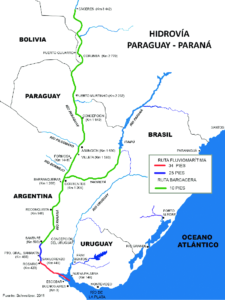The Paraguay-Paraná Waterway, with 3442 km, is one of the longest natural waterways in the world, being formed by the Paraguay, Paraná and Uruguay rivers. Developed in an area where more than 40 million inhabitants live, it is the main route for the physical and economic integration of Mercosur, through which more than 75% of the country’s foreign trade circulates.
 Argentina is far from the main consumer markets, such as Europe, Asia or Africa, representing a huge disadvantage compared to competing countries. The waterway makes it possible for ocean-going vessels to reach areas close to production, such as the agricultural export center of Greater Rosario, and thus partially compensate for the aforementioned disadvantage.
Argentina is far from the main consumer markets, such as Europe, Asia or Africa, representing a huge disadvantage compared to competing countries. The waterway makes it possible for ocean-going vessels to reach areas close to production, such as the agricultural export center of Greater Rosario, and thus partially compensate for the aforementioned disadvantage.
The Argentine section of this water highway began to have a better dredging and beaconing service a quarter of a century ago, which was decisive for the consolidation of the soybean industry pole in Rosario. Making Argentina a leader in this area, this allowed not only agricultural producers to obtain higher income due to lower logistics costs, but also expanded the productive frontier in regions farther away from the ports, such as the northeast and northwest of Argentina, also favoring other sectors of the economy that export and import minerals, automobiles, fertilizers and fuels through this route.
In order to guarantee the consolidation of this route, it is essential that the dredging continues to be carried out by experienced companies, since it requires sophisticated equipment and extensive technical knowledge.
We are convinced that the cost of these works and their maintenance should continue to be borne by the private sector, as it has been until now, without requiring contributions from the State, through the toll borne by international shipping vessels.
In this sense, it is essential that the funds contributed by the cargoes continue to be collected directly by whoever carries out the works in order to avoid delays in the settlement and to ensure the execution of the works in due time and form.
In the current context, in view of the upcoming call for bids for the dredging and beaconing of the trunk navigation channel, it is essential to maintain everything that has worked properly and introduce changes aimed at improving the logistic cost of Argentine agro-industrial exports by reducing freight costs, adapting the waterways to optimize the potential cargo carried by larger and deeper modern vessels, incorporating technology to improve navigability conditions and contributing to the consolidation of the country as a reliable exporter, always respecting environmental requirements.
The Rosario Stock Exchange considers that it is very important to establish an independent, autonomous and technical control body for the concession, with the participation of the provinces and representatives of the private sector, to verify and ensure the execution of the works and compliance with the terms of the contract.
This control should not be confused with the controls on navigation and transported goods, which have always been and should continue to be in charge of the State through different agencies, such as Customs, the Federal Administration of Public Revenues (AFIP), the Argentine Naval Prefecture and the Migration Office, since the concessionaire is only in charge of the dredging and signaling service.
The concession of the dredging and beaconing service of the navigable channel of the Paraná and La Plata rivers was successful, allowing to operate in very good conditions even in critical situations, such as the extraordinary low water level of the Paraná River in 2020. As in all transportation infrastructure works, it is necessary to project this waterway for the coming years, even beyond the concession term, and to incorporate the necessary improvements that will contribute to consolidate Argentina as one of the world’s leading food exporters, generating more job opportunities and higher foreign currency income, fundamental issues for our country to be able to move towards a sustainable and inclusive development of its economy.
